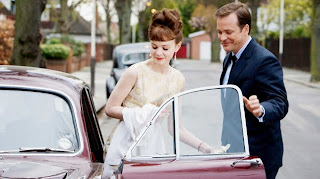**** out of ****
Directed by: Wes Anderson
Featuring the voice talents of: George Clooney, Meryl Streep, Jason Schwartzman, Bill Murray, Willem Dafoe, Eric Anderson and Michael Gambon
Running time: 87 minutes
Wes Anderson has been making cartoons his entire career.
The loopy personalities featured in Rushmore and The Life Aquatic and the offbeat eccentricity of The Royal Tenenbaums are quite absurd in their live-action surroundings. It was only time before the auteur would make a smooth transition into the foray of animated cinema.
It was well worth the wait. Fantastic Mr. Fox, based on Roahl Dahl's children's book, is an animated adventure that ranks among the upper pantheon of Pixar’s modern classics.
The titular Mr. Fox (George Clooney) is a sly and charming, yet restless wild thing who raids farms and steals chickens. He yearns to be a king of the wild frontier – he even listens to “The Ballad of Davy Crockett” on his Walk Sonic (the Walkman of the forest).
But after his wife (Meryl Streep) announces she’s pregnant, the Foxes decide that he should take a less risky job.
12 fox-years later, the two live in a cozy hole with their stubborn son, Ash (Jason Schwartzman). Now a newspaper columnist, Mr. Fox eyes a fancier home, inside the base of a tree.
His lawyer, Badger (Bill Murray) warns that the enormous facilities nearby the house belong to three cutthroat farmers: the chubby Boggis, the petite Bunce, and the petrifying Bean (Michael Gambon).
Nevertheless, Mr. Fox purchases the tree, befriending the building superintendent, a warm if clueless opossum named Kylie (Wallace Wolodarsky).
The Foxes move in, alongside nephew Kristofferson (Eric Anderson, brother of Wes). The youngster has a golden touch at everything (from studies to athletics, including Whackbat, a sport that makes Quidditch look likes Rock, Paper, Scissors). This catches Mr. Fox’s eye, but makes Ash envious.
Living near the Boggis, Bunce and Bean estates, Mr. Fox and Kylie plan capers, sneak into the three farms and steal lots of produce. While the heists are initially successful, the farmers soon realize that something’s amiss.
Animation-wise, Fantastic Mr. Fox is unlike anything you’ve ever seen. Anderson and cinematographer Tristan Oliver (who photographed Chicken Run) decided to shoot the film at a rate of 12 frames per second (rather than the more fluid 24) so that viewers would notice the stop-motion medium. The result is simply groundbreaking.
It takes around a minute to get used to the frantic stop-and-start rhythms of the animation. Thankfully, there’s 86 more minutes to bask in it.
The design of the film is charming, full of scruffy textures and in-jokes that will fly by less observant viewers. As well, many of the specials effects are downright awe-inspiring. The film struts its stuff, but doesn’t wallow in it - the story never lags beneath the visual wizardry.
Despite the swift pacing and sublime dazzle, these foxes (and badgers, and rats, oh my) are quite relatable.
Mr. Fox, while the Danny Ocean of the forest, is a caring friend and loyal family man. He even takes a few quiet moments for his existential thoughts (Who am I? he ponders). Mrs. Fox is a sweet and perceptive wife, but she has a ferocious bite, as well. Even with the mayhem and relentless action, the animals have a tender humanity.
The script is also pitch-perfect, blending energetic situations, warm family-friendly morals, several touches of dry humour (vintage Anderson) and sharp one-liners.
One of the film’s most endearing quirks is the use of the word “cuss” as a substitute for harsh profanities. “If you're gonna cuss, you're not gonna cuss with me, you little cuss!” Badger roars at one point.
Not to worry parents, though: this is terrific entertainment for both adults and kids – although for entirely different reasons.
Kids will marvel at the wild story, colourful characters, and enchanting visuals. Adults will chuckle (rather heartily) at the sharp wit, and enjoy its deft intelligence and dynamic soundtrack (featuring vintage Beach Boys, rockin’ Rolling Stones and a whimsical Alexandre Desplat score).
In a just world, Mr. Fox would have stolen all the prints of New Moon and 2012, incinerated them, and replaced them with this sheer delight.
Fantastic Mr. Fox features more wit, more thrills and more laughs per minute than any release this year. It’s a mothercussin’ masterpiece!


















